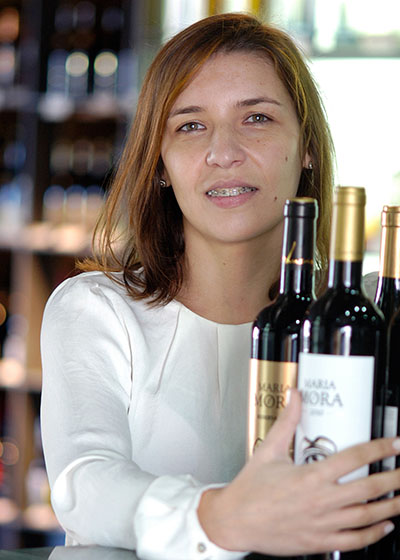
I often say that being a winemaker is not a profession, but a way of life, and yet it is quite rewarding!
Lúcia Freitas, winemaker, born in Viseu, started at just 25 years old, although she has always had contact with the world of wine. She is from a small village in Dão and her grandfather is a small producer in the region, having always participated in vineyard and wine activities. This area has always aroused a lot of curiosity in him. She is currently part of the Magnum project.
What is your professional path?
After completing my Chemistry course I worked for two years in a laboratory, which although it was an attractive profession with a strong research component, I realized that I didn’t like the routine and being “closed” inside a laboratory. I started working in the Dão Sul laboratory and in the same year I started working in the field of oenology.
As a winemaker, what were your biggest challenges?
This profession is very demanding in terms of time and dedication. There are no defined schedules or holidays or weekends and as it is a very social job we often have to integrate it into our own lives. It becomes almost impossible to separate personal and professional life. I often say that being a winemaker is not a profession, but a way of life. It is, however, quite rewarding!
What do you think is most relevant about the evolution of the wine market in recent years?
There was a very positive evolution. Average quality has increased and prices are increasingly accessible to the common consumer. The demand for information and desire to know is also increasing and this helps people to distinguish wines not only by price but also by quality.
What do you think of wine service in restaurants?
Although it is improving, it still has some flaws. If, on the one hand, nowadays restaurants treat wine better in terms of conservation and serving glasses, there is still a lack of training for restaurant staff. This is slowly changing, but it is an essential factor.
What do you think of the wine service by the glass?
I think it’s an excellent idea. It allows the consumer to try wines that they otherwise would not be able to, because they are too expensive, or to pair different dishes with the wines that best suit them instead of having to order just one bottle to accompany starters, main course and dessert. However, such training is essential for restaurants so that they know how to properly preserve wine after opening, so that it does not lose quality.
What restaurant experience impressed you the most?
I really like eating and trying different restaurants, so it’s difficult to choose… maybe the sushi at the Kinoshita restaurant in São Paulo. But I also had excellent experiences in Portugal, for example in Porto I highlight Pedro Lemos, Foz Velha or the simpler Forneria de São Pedro. In Lisbon, Tasca da Esquina, Largo or Ramiro.
What wine did you try that touched you the most?
I love old wines. For me, the feeling of drinking a wine that is over 100 years old is indescribable! Making wines that last for several years is an art and I hope that in 20 years my wines will still be well preserved! I highlight the Andresen Porto Colheita 1910, an absolutely divine wine.
What do you think of the evolution of the penetration of Portuguese wines in the world market?
There are improvements here too. Exports are increasing and more importantly, the average selling price is increasing. Portugal does not have the scale to compete with the largest producing countries in terms of price, so we must focus on premium wines, always having an excellent price-quality ratio. Selling abroad requires a large investment so it is only worth it if you get a good return.
Source: Alivetaste
© Quinta da Mariposa | Developed by Mixlife